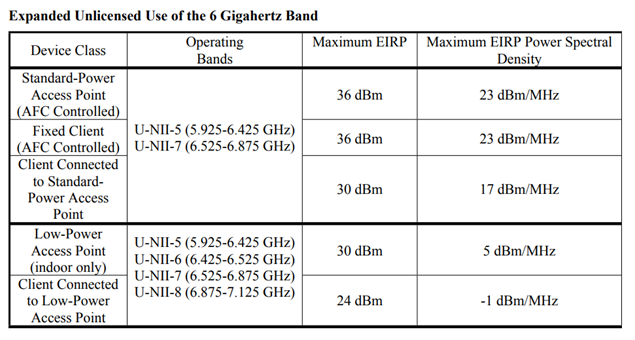- Services
- Industries
- Automotive
- Battery
- Building inspection
- Fire alarms system testing
- Household appliances
- Installation materials
- Industrial machinery
- IT & audio video
- Laboratory, test & measurement
- Lighting equipment
- Maritime, oil & gas
- Medical & healthcare equipment
- Military & aerospace product testing
- Wireless & telecom
- Resources
- About
- Blog
- Events
With the development of the new Wi-Fi 6E (802.11ax) and the efforts to ensure worldwide adoption, interoperability, and more secure and reliable technology, Wi-Fi 6E comes with a new element called Automated Frequency Coordination (AFC) System, where the AFC system automatically determines and provides lists of frequencies that are available for use by standard power access points operating in the 5.925-6.425 GHz and 6.525-6.875 GHz bands.


Testing and new requirements
Besides the traditional FCC Part 15E rules (Power limits, Undesirable emission limits/RF Exposure/ Frequency Stability/DFS, etc) applicable to prior Wi-Fi 5 GHz devices, the FCC has recently published a public notice, DA 22-1146 where the Office of Engineering and Technology (OET) announced conditional approval for 6 GHz band automated frequency coordination systems.
In that public notice, the FCC conditionally approved thirteen entities to operate automated frequency coordination (AFC) systems to manage access to the 6 GHz band spectrum by standard-power unlicensed devices:
Broadcom, Google, Comsearch, Sony Group, Kyrio, Key Bridge Wireless, Nokia Innovations, Federated Wireless, Wireless Broadband Alliance, Wi-Fi Alliance (WFA), Qualcomm, Plume Design, and RED Technologies.
Following the conditional approval, and whilst the entities continue to develop their AFC systems, the next phase in the approval process will entail testing to verify that they operate in accordance with the Commission’s rules. Currently, with testing protocols still being developed, the OET will provide additional information in future releases. The OET will provide approval for commercial operations to those AFC systems that successfully complete testing. The AFC requirements are listed under FCC Title 47 Part 15 Subpart E: §15.407 General technical requirements section (k) Automated frequency coordination (AFC) system. Public notice DA 22-1146 describes the AFC system testing but also provides guidance on lab testing requirements.
The public notice specifies that since many FCC-recognized accredited labs already possess expertise for similar testing as is required for AFC systems, the FCC-recognized accredited testing laboratories that have also been approved through WinnForum’s Citizens Broadband Radio Service Device (CBSD) testing and certification will be allowed to perform AFC system lab testing once the Commission approves such procedures. The FCC made this determination because the AFC system lab testing will (similar to CBRS device testing) involve using test harness software to send and receive information from the server on which the AFC system is running. Consequently, the FCC believes that this subset of FCC-recognized accredited testing laboratories has the capability to conduct the AFC system lab testing. No additional certification or permission from OET will be necessary for these labs.
Within the Nemko Group, the following Testing Laboratories are part of the OnGo Certification program:
 Nemko Montreal & Ottawa (Program Contact: Charles Neal; charles.neal@nemko.com)
Nemko Montreal & Ottawa (Program Contact: Charles Neal; charles.neal@nemko.com)
Nemko San Diego (Program Contact: Juan M Gonzalez; juan.gonzalez@nemko.com)
About Nemko
As a significant international player in the world of wireless technologies, Nemko offers an array of comprehensive radio testing and certification solutions, meeting the regulatory requirements for a wide range of product categories found across the globe, including authorization by the CBRS Alliance for the OnGo Certification Program. Learn more about our extensive Radio device testing and certification services, including Wi-Fi 6E.
Juan Manuel Gonzalez
Business Development Manager Wireless/EMC Division at Nemko

